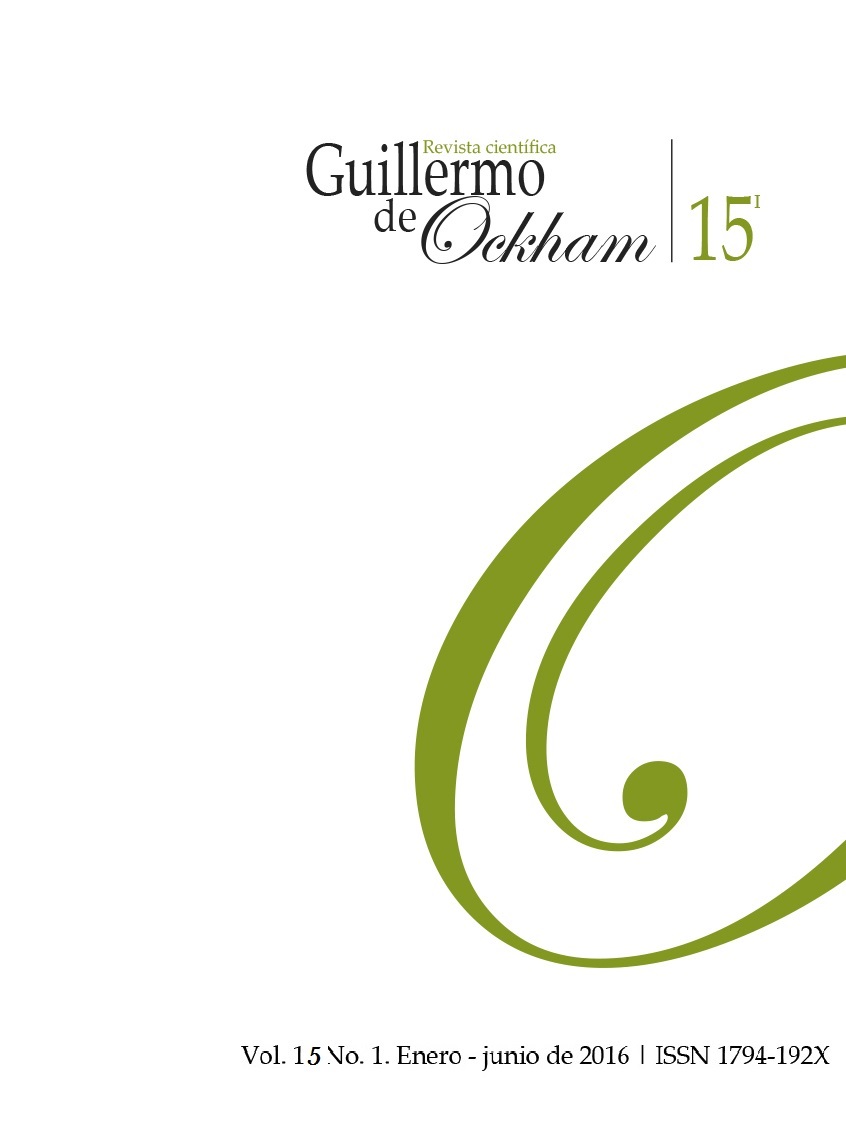The Revista Guillermo de Ockham provides an immediate and open access to its content, based on the principle of offering the public a free access to investigations to provide a global interchange of knowledge.
Unless otherwise established, the contents of this journal has a license with Creative Commons Attribution-NonCommercial-NoDerivatives 4.0 International (CC BY-NC-ND 4.0) http://creativecommons.org/licenses/by-nc-nd/4.0/
- Attribution: You must give appropriate credit, provide a link to the license, and indicate if changes were made. You may do so in any reasonable manner, but not in any way that suggests the licensor endorses you or your use.
- NonCommercial: You may not use the material for commercial purposes.
- NoDerivatives: If you remix, transform, or build upon the material, you may not distribute the modified material.
- No additional restrictions: You may not apply legal terms or technological measures that legally restrict others from doing anything the license permits.
Abstract
References
BARTHES, R. (2010). Mitologías. México: Siglo Veintiuno.
CARPIZO, J. & VILLANUEVA VILLANUEVA, E. (2001). El derecho a la información: Propuestas de algunos elementos para su regulación en México. En D. Valadés y R. Gutiérrez Rivas (coords.), Derechos Humanos: Memoria del IV Congreso Nacional de Derecho Constitucional, t. III (pp. 71-101). México: UNAM, Instituto de Investigaciones Jurídicas.
DIENEL, P. C. (1989). Contributing to social decisión methodology: Citizen reports on technological projects. En C. Vlek y G. Cvetkovich (eds.), Social decisión methodology for technological projects (pp. 133-152). Dordrecht: Kluwer.
DIENEL, P. C. & RENN, O. (1995). Planning cells: A gate to «fractal» mediation. En O. Renn, T. Webler y P. Wiedemann (eds.), Fairness and competence in citizen participation: Evaluating models for environmental discourse (pp. 117-140). Dordrecht: Kluwer.
EGAN, M. E. & SHERA, J. H. (1952). Foundations of a theory of bibliography. The Library Quarterly: Information, Community, Policy, 22 (2), 125-137.
ESS, C. & THORSETH, M. (2008). Kant and information ethics. Ethics and Information Technology, 10 (2-3), 205-211.
FLORIDI, L. (2012). Toleration and the design of norms. Science and Engineering Ethics, 21 (5), 1095-1123.
Rev. Guillermo de Ockham 15(1) 2017 Articulo IN PRESS
HABERMAS, J. (1991). Escritos sobre moralidad y eticidad. Barcelona: Paidós Ibérica: Universidad Autónoma de Barcelona, Instituto de Ciencias de la Educación.
HABERMAS, J. (2008). Teoría y praxis: Estudios de filosofía social. Madrid: Tecnos.
HERNÁNDEZ PACHECO, F. (2008). La vinculación de las bibliotecas públicas de México con los gobiernos, el sector privado, la sociedad civil y los organismos internacionales. El Bibliotecario, 8 (74-75), 11-17.
JENOFONTE (1999). Anábasis. Madrid: Cátedra.
Lombardi, O., & López, C. (2016). Los múltiples rostros de la filosofía de la información. Rev. Guillermo de Ockham, 14(2), 21-32. doi: http://dx.doi.org/10.21500/22563202.2432
MORALES CAMPOS, E. (2011). La disponibilidad social del conocimiento: Una responsabilidad del bibliotecario. En F. Martínez Arellano (coord.), Coloquio Acceso Abierto a la Información en las Bibliotecas Académicas de América Latina y el Caribe (pp. 3-12). México: UNAM, Centro Universitario de Investigaciones Bibliotecológicas: International Federation of Library Associations and Institutions, Latin America and the Caribbean Section.
OLIVÉ, L. (2004). Interculturalismo y justicia social: Autonomía e identidad cultural en la era de la globalización. México: UNAM, Programa Universitario México, Nación Multicultural.
OLIVÉ, L. (2007). La ciencia y la tecnología en la sociedad del conocimiento: Ética, política y epistemología. México: Fondo de Cultura Económica.
ORTEGA Y GASSET, J. (1962). Misión del bibliotecario (y otros ensayos afines). Madrid: Revista de Occidente.
POPPER, K. R. (1996). Los libros y el milagro de la democracia. Leer y Releer, 11, 3-32.
RAWLS, J. (2014). Teoría de la justicia. México: Fondo de Cultura Económica.
RENDÓN ROJAS, M. Á. (2005). Bases teóricas y filosóficas de la bibliotecología. México: UNAM, Centro Universitario de Investigaciones Bibliotecológicas.
RENDÓN ROJAS, M. Á. (2013). Una epistemología dialéctica de la ciencia de la información: Entre Ariadna y Penélope. En F. Ribeiro y B. Rodríguez Bravo (coords.), VI Encontro Ibérico EDICIC 2013: Globalização, Ciência, Informação, Atas (pp. 33-48). Portugal: Universidade do Porto, Facultade de Letras, Centro de Estudos das Tecnologias e Ciências da Comunicação; España: Universidad de Léon.
RÍOS ORTEGA, J. (2011). La información como bien público: La responsabilidad social del bibliotecólogo. En E. Morales Campos (coord.), Derecho a la información, bien público y privado: Acceso comunitarios y acceso individual (pp. 175-186). México: UNAM, Centro Universitario de Investigaciones Bibliotecológicas.
SCHOPENHAUER, A. (2004). La lectura, los libros y otros ensayos. Madrid: Edaf.
TOURAINE, A. (2000). ¿Podremos vivir juntos?: Iguales y diferentes. México: Fondo de Cultura Económica.
VILLORO, L. (1998). Estado plural, pluralidad de culturas. México: Paidós: UNAM, Facultad de Filosofía y Letras.
VILLORO, L. (2009). Para un proyecto nuevo de nación. Theoria: Revista del Colegio de Filosofía, 19, 37-46.
WEIL, É. (1970). Hegel y el Estado: Cinco conferencias y un apéndice. Córdoba, Argentina: Nagelkop.
































